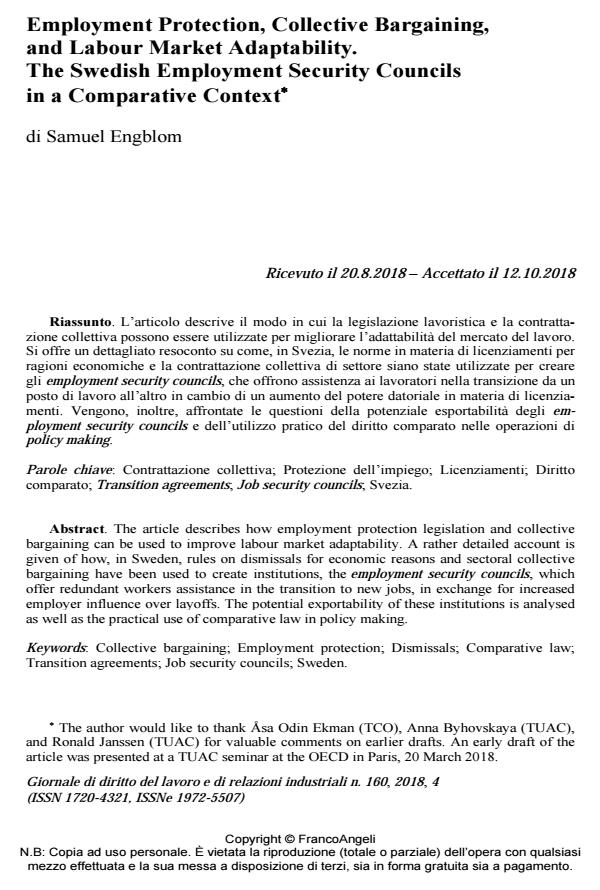Employment Protection, Collective Bargaining, and Labour Market Adaptability. The Swedish Employment Security Councils in a Comparative Context
Titolo Rivista GIORNALE DI DIRITTO DEL LAVORO E DI RELAZIONI INDUSTRIALI
Autori/Curatori Samuel Engblom
Anno di pubblicazione 2019 Fascicolo 2018/160
Lingua Inglese Numero pagine 19 P. 887-905 Dimensione file 263 KB
DOI 10.3280/GDL2018-160009
Il DOI è il codice a barre della proprietà intellettuale: per saperne di più
clicca qui
Qui sotto puoi vedere in anteprima la prima pagina di questo articolo.
Se questo articolo ti interessa, lo puoi acquistare (e scaricare in formato pdf) seguendo le facili indicazioni per acquistare il download credit. Acquista Download Credits per scaricare questo Articolo in formato PDF

FrancoAngeli è membro della Publishers International Linking Association, Inc (PILA), associazione indipendente e non profit per facilitare (attraverso i servizi tecnologici implementati da CrossRef.org) l’accesso degli studiosi ai contenuti digitali nelle pubblicazioni professionali e scientifiche.
The article describes how employment protection legislation and collective bargaining can be used to improve labour market adaptability. A rather detailed account is given of how, in Sweden, rules on dismissals for economic reasons and sectoral collective bargaining have been used to create institutions, the employment security councils, which offer redundant workers assistance in the transition to new jobs, in exchange for increased employer influence over layoffs. The potential exportability of these institutions is analysed as well as the practical use of comparative law in policy making.
L’articolo descrive il modo in cui la legislazione lavoristica e la contrattazione collettiva possono essere utilizzate per migliorare l’adattabilità del mercato del lavoro. Si offre un dettagliato resoconto su come, in Svezia, le norme in materia di licenziamenti per ragioni economiche e la contrattazione collettiva di settore siano state utilizzate per creare gli employment security councils, che offrono assistenza ai lavoratori nella transizione da un posto di lavoro all’altro in cambio di un aumento del potere datoriale in materia di licenziamenti. Vengono, inoltre, affrontate le questioni della potenziale esportabilità degli employment security councils e dell’utilizzo pratico del diritto comparato nelle operazioni di policy making.
Parole chiave: Contrattazione collettiva; Protezione dell’impiego; Licenziamenti; Diritto comparato; Transition agreements; Job security councils; Svezia
Samuel Engblom, Employment Protection, Collective Bargaining, and Labour Market Adaptability. The Swedish Employment Security Councils in a Comparative Context in "GIORNALE DI DIRITTO DEL LAVORO E DI RELAZIONI INDUSTRIALI " 160/2018, pp 887-905, DOI: 10.3280/GDL2018-160009